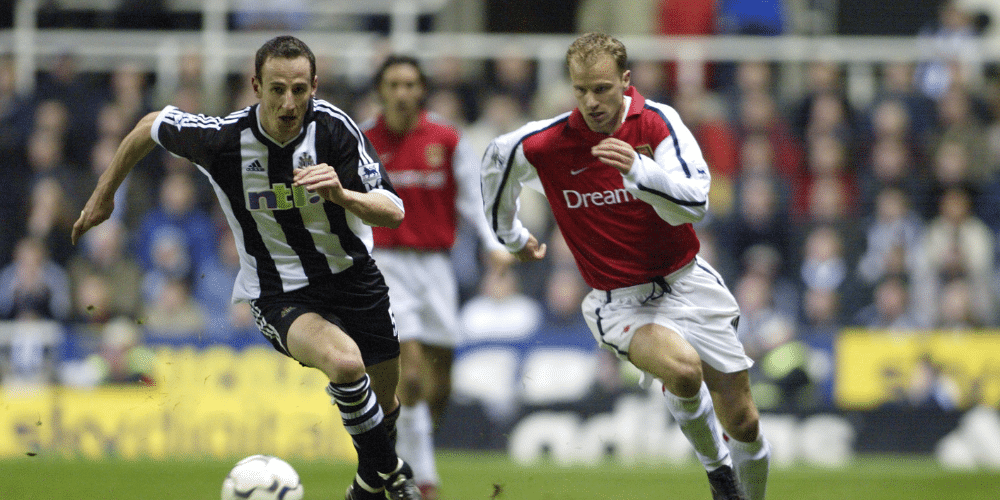Dennis Bergkamp: A Football Poet in North London
Dennis Bergkamp was more than just a footballer; he was a maestro, a poet who painted pictures on the pitch. His decade at Arsenal was a testament to his extraordinary talent and his profound impact on the club. When Bergkamp arrived in North London, Arsenal was renowned for its formidable defense, a legacy built under the tenure of George Graham with the legendary ‘Back Five.’ However, the Dutchman brought a different kind of magic to the Emirates. His elegance and creativity not only enhanced the team’s style of play but also played a crucial role in the club’s evolution under Arsene Wenger. Bergkamp’s presence transformed Arsenal’s game, adding a refined touch that turned their football into a beautiful art form. His contributions were pivotal to the club’s domestic double success in the 1997/98 season and again in 2002, culminating in his part in the historic ‘Invincibles’ title-winning team of 2004.
The Arrival of Elegance
Bergkamp’s arrival at Arsenal in 1995 marked a significant shift in the club’s identity. While Arsenal had a reputation for being a solid and disciplined team, Bergkamp’s flair and technical brilliance brought a new dimension to their football. His ability to control the ball with precision and his visionary passing often left opponents bewildered. Under Wenger, Bergkamp flourished, becoming a central figure in the team’s attacking play. His partnership with players like Thierry Henry and Robert Pires was a sight to behold, and together, they formed one of the most lethal front lines in the Premier League. Bergkamp’s influence was not just in his goals but in the way he orchestrated play, making every touch and every pass seem effortless and elegant.
A Legendary Day at St James’ Park
On March 2, 2002, Dennis Bergkamp etched his name in Premier League folklore with a goal that many consider the greatest ever scored in the league. The match against Newcastle United at St James’ Park was of immense significance, as both teams were vying for a chance to secure the title. The atmosphere in the stadium was electric, and the pressure was high. Bergkamp, known for his composure under pressure, delivered a moment of sheer brilliance. Receiving the ball on the edge of the penalty area, he executed a unique spin move that completely deceived Nikos Dabizas, leaving the defender floundering. With consummate skill, Bergkamp then fired a perfectly placed shot into the corner of the net. The goal was a masterclass in technique and artistry, capturing the essence of what made Bergkamp such a special player.
The Goal: A Blend of Skill and Imagination
Analyzing the goal in detail reveals the genius behind Bergkamp’s play. The ball was played to him in a congested area, with defenders closing in from all angles. Instead of panicking or forcing a shot, Bergkamp remained calm. His first touch was a subtle caress of the ball, setting up the stage for his next move. The spin itself was a combination of body swerve and a quick change of direction, executed with such finesse that it left Dabizas dizzy. The finish was equally impressive, with Bergkamp choosing the exact right moment to strike the ball. The placement and power of his shot ensured that it found the net, leaving the Newcastle goalkeeper with no chance. This goal was not just a highlight of the match but a moment that defined Bergkamp’s legacy in the Premier League.
A Lasting Impact and Complimenting Team Success
Bergkamp’s goal against Newcastle was more than just a piece of individual brilliance; it was a symbol of the team’s transformation under Wenger. Arsenal’s style of play became synonymous with fluid, attacking football, and Bergkamp was at the heart of it. His ability to create and score goals not only helped the team secure crucial points but also inspired his teammates to play with confidence and flair. The 2002 double success was a testament to the harmony and synergy within the team, with Bergkamp’s contributions playing a vital role. His partnership with Henry, in particular, was a key factor in Arsenal’s dominance during this period. The two players shared a telepathic understanding, often reading each other’s movements and thoughts on the pitch.
The ‘Invincibles’ and Beyond
Bergkamp’s legacy at Arsenal reached its zenith in 2004 when the team, known as the ‘Invincibles,’ won the Premier League without a single defeat. This achievement was a culmination of the club’s evolution, and Bergkamp’s influence was felt throughout the season. His ability to control the tempo of the game and his clinical finishing were instrumental in keeping the team at the top of the table. Even as he entered the latter stages of his career, Bergkamp continued to produce moments of magic that kept fans and critics alike in awe. His decision to retire from international football in 1999 did not diminish his impact on club level, where he remained a key player until his retirement from professional football in 2006.
A Legacy of Beauty and Inspiration
Dennis Bergkamp’s time at Arsenal was a period of unmatched creativity and elegance in English football. His goal against Newcastle in 2002 is a perfect encapsulation of his talent and the transformation he brought to the club. Fans and analysts continue to debate whether it is the greatest Premier League goal of all time, but one thing is certain: it is a moment that will be remembered for generations to come. Bergkamp’s legacy extends far beyond that single goal, however. He inspired a generation of players and fans with his artistry and grace, making football a beautiful game to watch. As we reflect on his career, it is clear that Bergkamp’s influence on Arsenal and the Premier League will never be forgotten.











